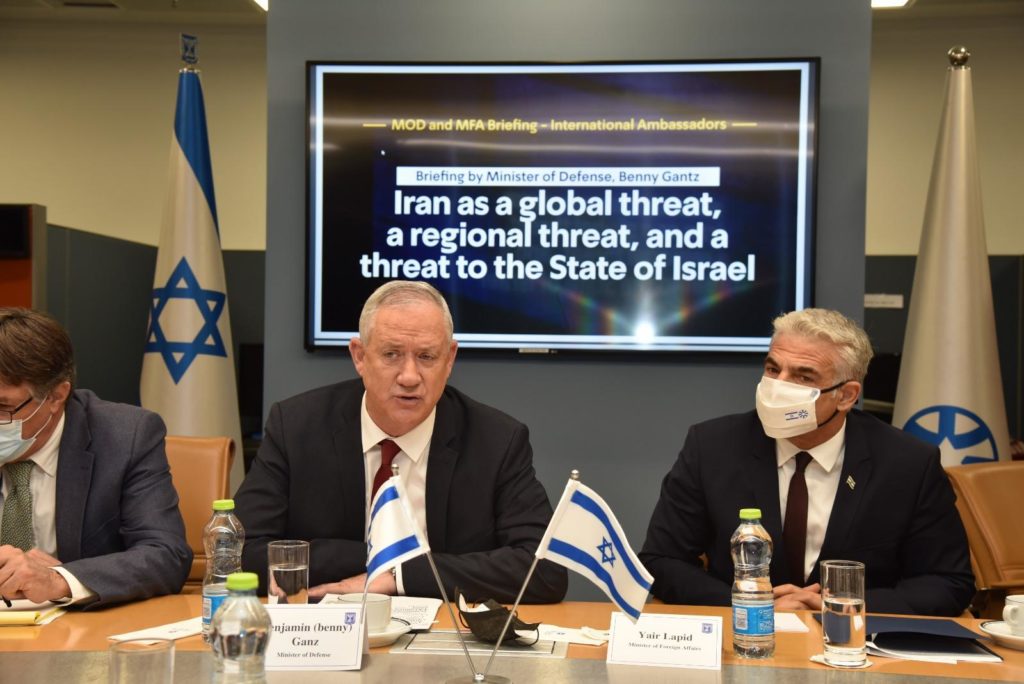
With the threat of a nuclear Iran looming in the background, and the successful and expanding Abraham Accords making good news in the foreground, Israel’s neighbors are seeing the Jewish nation in a positive light according to Israeli Defense Minister Benny Gantz. “The countries of the region understand that Israel is here to stay and that Israel is not a burden but rather an asset,” said Gantz last Thursday in an interview at the Aspen Security Forum that was republished by Israel. “Our excellent relations with the US can be used as a bridge. Israel does not threaten the countries of the region, while Iran does.”
In his comments, Gantz celebrated Israel’s integration into the broader Middle East, noting that since the Abraham Accords were signed in 2020, Israel has been in “hundreds of meetings and discussions” and “participated in at least 10 multinational exercises” with regional partners. Gantz also alluded to the Middle East Air Defense Alliance while noting that “we are creating a regional architecture for defense.”
The reason this cooperation is so critical? Iran.
“Iran is first a global challenge, then a regional challenge and only lastly it is a threat to the State of Israel. We can see it everywhere around the world—the Iranian impact in Venezuela, Algeria, Lebanon, Syria, Iraq, Yemen,” said Gantz. “The Saudis and the Emiratis also suffer from Iranian attacks; Iran does not only pose a threat to the State of Israel.”
That doesn’t mean that Israel is not uniquely threatened by Iran, which more than once has called for Israel’s destruction and actively sponsors terror groups that regularly attack or endanger Israel. “I do not know of another country that has another country, in this case Iran, threatening its existence and building the means to do so. The government and leadership of Israel has a historic responsibility to build our capabilities and to prevent Iran from becoming nuclear,” said Gantz.
The Iranian nuclear threat has recently become more urgent, with the Islamic Republic expanding their nuclear fuel production and quality—thereby reducing the so-called “breakout” time needed to develop a nuclear weapon. This comes as the major world powers have had extensive and so far fruitless discussions with Iran aiming to resurrect the nuclear deal that exchanged sanctions relief for self-imposed restrictions on Iran’s nuclear program.
Gantz, in the “fireside chat” moderated by the Atlantic’s Jeffrey Goldberg, highlighted the danger posed by a nuclear Iran—who already is a leading sponsor of terrorism. “We can see Iran’s malign activity in the region without a nuclear canopy, without nuclear deterrence. Imagine what they would do with it,” said Gantz. “And that’s why we cannot let Iran become a nuclear [state].”
One noteworthy party that has not yet joined the Abraham Accords is the Palestinians, but Gantz still has hopes in how the regional peace deals can impact Israel’s closest ongoing conflict. “I believe that we can leverage the Abraham Accords and ties with regional partners in order to strengthen the Palestinian Authority and promote confidence-building measures. From a Jewish, Zionist, and democratic perspective, I would like to see a better future between us and the Palestinians and that includes separating from the Palestinians,” said Gantz, presumably referencing a two-state solution to the territorial dispute.
The Abraham Accords were unusual in that they managed to achieve diplomatic normalization between Israel and Arab nations in the region without Israel surrendering territory to the Palestinians or others.
However, even without their closest neighbors being part of the Abraham Accords, Israel’s top Defense official still sees the peace agreement as a wide-ranging success almost two years after it was signed.
“The Abraham Accords enable us to expand our relations [with regional partners] in security aspects, in business to business [frameworks], organizations to organizations, and people to people,” said Gantz.
And after noting the military cooperation in the region, he added, “I am very happy that the US has led this and that the region’s leaders have realized and taken this opportunity. We are creating a better Middle East.”
(By Joshua Spurlock, www.themideastupdate.com, July 24, 2022)
